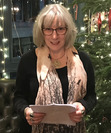Paula R.C. Readman's Blog, page 46
April 20, 2021
An Evening of Confusion
There’s a saying about those who can do, those who can’t teach. The saying comes from a George Bernard Shaw’s four-act drama, ‘Man & Superman.’ The drama’s first production was at the Royal Court Theatre, London 1905. One character was complaining about his writing teacher who had discouraged him by saying his novel was rubbish. The other character replied, “Don’t listen to her, remember those who can’t teach.”
 Photo by cottonbro on Pexels.com
Photo by cottonbro on Pexels.comAfter my fourth evening as a mature student at my local college in 2005, I also believed the saying was true. All these years later, I wouldn’t claim to be an expert on English grammar but there again I wouldn’t teach English or creative writing to anyone.
I shall leave you to make up your own mind about Mr C and his teaching skills.
Day 4 of 32.
I was the first to arrive at the classroom, closely followed by the lady who I thought was from Ireland.
“No, she said, “I’m from Holland.”
“Your English is very good. My aunt is from Amsterdam.”
“In my country, we are taught English from the age of nine to 19 years old,” she said.
Ms Bright Smile was the next to join us and the Dutch lady asked her if she could let us in to the room.
“We’re to have a classroom assistant this week,” I said.
“Are we?” Ms Bright Smile said, “Mr C had to have one last year. And there were only four of us then.”
“It’s a good job I came along then,” said a lady who had been quietly waiting to one side of the hallway. We all laughed.
Just as Ms Bright Smile was trying to see if she could remember the code to open the door’s lock, Mr Andrews, the math teacher came by and let us in.
When Mr C arrived, he introduced us to the classroom assistant then chatted to her before starting the lesson. We had to wait a few minutes to see if anyone else would be arriving. This week we had lost four more of our students. Mr C began the lesson by asking the Dutch Lady, “If she ran?”
“Only if I’m late,” was her reply.
He then asked Ms Bright Smile.
“I don’t run, I walk,” was her answer.
Then he turned to me, I smiled and said the same as the Dutch Lady. He asked Ms Giggles if she ran too. By now I was wondering if it was a trick question when he picked up a pile of worksheets and started to hand them out.
“Today, we are going to talk about adverbs.” Mr C read from the BBC Skillswise factsheet. “Adverbs are words that tell us more about verbs. They add information to the verb. Using adverbs makes your sentences more interesting. The girl smiled nervously. This is telling us how the girl smiled, it adds more information.”
On the next sheet we learnt about where you could position an adverb.
At the beginning of a sentence: Suddenly I had earache.
In the middle of a sentence: I suddenly had earache.
Or at the end of a sentence: I had earache suddenly.
I put up my hand and asked a question about adverbs and tenses. Does where you place an adverb in a sentence change the tense of that sentence?
Mr C chatted on about the word, ‘Suddenly,’ and left me feeling pretty stupid and confused. I began to think that maybe I didn’t explain my question well enough for him to understand.
He rushed through the next three fact sheets. These were on spotting adverbs, more about spotting adverbs, and adverbs – degrees of comparison. Both Lady G and I were left feeling confused.
For the rest of the evening we worked our way through the BBC Skillswise work sheets. Mr C came round, and marked our work even though we had the answers to the question already. He had stapled the answer sheet to the work sheets he had given us.
 Photo by Ivan Samkov on Pexels.com
Photo by Ivan Samkov on Pexels.comLady G asked Mr C whether there were any books which explained the rules of English Grammar. Mr C smiled and said there weren’t any golden rules, and he still found grammar very confusing.
I was shocked by his statement. Having a teacher who tells you that he finds grammar complicated is worrying. If he can’t understand it, how on earth was I going to master it?
And, if you are still wondering why Mr C began the lesson by asking us all, if we have been running.
I’ve no idea at all. Oh well, here’s hoping next week is just as exciting.
Of course, my tongue is firmly in my cheek.
April 18, 2021
An Object or Complement?
Now I’ve always believed in giving others the benefit of the doubt. So being forever hopeful and knowing it was, after all, only day three of thirty-two I gave Mr C the benefit of the doubt and kept my fingers crossed that things would improve. I had done evening classes before, and found them to be far more structured. Normally, in the first lesson you would learn what would happen in future classes. I had studied Art, Art history and researching Family History all via evening classes.
 Photo by Katerina Holmes on Pexels.com
Photo by Katerina Holmes on Pexels.comDay 3 of being a Mature Student
After last week, I was feeling a bit apprehensive. I so wanted this course to deliver the goods to help me improve my writing. I arrived to find the classroom door open. On entering, I found two of the students sitting chatting, Motorbike Dave, without his female companion this time, and another student, Ms Giggles.
Ms Giggles told us, she was really enjoying the maths course so much more than the English one. “I’m learning far more about maths than I ever did in school. The maths teacher is very good.”
Then Ms Bright Smile arrived and asked where Mr C was?
“We have no idea,” Ms Giggles said.
When Mr C arrived he walked in eating a bounty bar and told us. “It’s my dinner.” As we waited for the rest of the class, he chatted on, telling us how his sister had come to visit him, and he’d left her doing his ironing.
Once the class had arrived, Mr C clapped his hands together and announced, “We have an exciting evening before us.”
I offered a prayer up to any god, who happened to be listening.
Mr C then handed out sheets of paper to the class. On receiving mine, I noticed it was ‘What is grammar? And Ann is in her car.’
Ms Giggles shouted out, “We’ve done this last week.”
“Oh, have we.” Mr C said, in surprise, and started to hand out another sheet from the pile on his desk.
“Sentences,” Mr C said, “on this sheet you can see three boxes, first box is the subject, second box is verb, and the third is the complement i.e. 1) Brighton Palace Pier 2) is 3) A great adventure.
I was puzzled. We’d learnt a sentence has within it a subject, verb, and object, last week. Now he told us the sentence had a complement. We all sat there confused.
(Since coming home, I looked the word ‘complement’ up and found in grammar it means: a word or phrase added to a verb to complete the predicate of a sentence.)
 Photo by Gary Barnes on Pexels.com
Photo by Gary Barnes on Pexels.comNext, he handed us a page from George Eliot’s ‘The mill on the Floss.’
“Now if you would all like to read the first sentence at the beginning of chapter six,” Mr C said.
‘Poor Tom bore his severe pain heroically, and was resolute in not ‘telling of Mr Poulter more than was unavoidable; the five-shilling piece remained a secret even to Maggie.’
For those of you who do not know George Eliot was a woman, and as you can see her sentence is both long and boring,” Mr C informed us.
I put my hand up and said, “Wasn’t she writing in the style of her time.”
“Yes, she was,” he said, peering over the top of his glasses. “Right now, we will look at this one.” He handed out another sheet. “This had very short sentences.”
‘One more headache/one more headache drink/ one more lounge. The Moon Room at the Stardust-low lights and moon maids in tights. Pete sipped scotch. A moon maid fed him peanuts.’
“James Elroy wrote this and as you can see he doesn’t use adverbs,” Mr C informed the class. “If you look at the sentence. ‘Wayne Junior said no.’ We have a subject, ‘Wayne Junior,’ we have a verb ‘Said’ and a complement ‘No.’ Now if you all look at the next sheet ‘Complement.’ The complement comes after the verb. It tells us more about the subject. One way of checking whether this is right, is to try the following:
1) Find the verb.
2) Cross it out and replace with an equals sign.
3) If the sentence still has the same meaning, then the part after the verb is the complement.
Example: That TV programme was the best last year.
That TV programme = the best last year.
However, if it doesn’t work, you will know you are wrong i.e. my grandfather keeps a pig.
My grandfather = a pig.
Linking verbs.
The commonest linking verbs are am/is/are, was /were, has been/have been.
“Right, is anyone asleep yet?” Mr C said, brightly. “No, good now I would like you to write out a few sentences using the notes on the building sentences sheet.”
We all worked away quietly. After a short while Mr C came round and marked our work.
I passed with flying colours.
Mr C then announced it was time for a break and the classroom emptied quicker than it filled at the beginning of the lesson. Before Mr C had time to leave, I asked him if he could have a quick look at my writing. I showed him the piece; I had posted on my blog. ‘The small, uninteresting house stood back from the road etc…’ and asked him to read just the first paragraph. Mr C smiled and told me he was a failed writer and he wrote thriller and espionage novels. When he finished reading through the first page he went on to the second. I said “thank you for helping me, but you’ll miss your break if you carry on.”
“It’s very good, but you need help with your grammar,” he said looking up.
I smiled and said, “Yes, I know that’s why I’m here.”
“Once I’ve given the rest of the class some work to do I’ll finish looking at it. Next week, I’ll have someone to help me in the class as I can’t get to see everyone.”
After the smoke break, Mr C set some of the students to work on the computers on a BBC website, Skills wise.
He came and finished looking at my scribbling, marking where I needed to make some changes and explained what I needed to do. “You need to use semicolon more in your work; I will be explaining how to use them in week 5…”
Yes, fantastic! I wanted to scream aloud. At last this is what I wanted to hear; what we were going to be doing in future classes. It was a great evening, and I almost danced out of the classroom as I felt I had learnt something. I was on cloud nine when I met my husband outside.
Now I can’t wait until next week.
 Photo by Andrew on Pexels.com
Photo by Andrew on Pexels.comOh, to have such faith… One can, but hope Hmm, wait for the tumble.
Hmm, wait for the tumble.
Now after a busy weekend in my garden, I’m off for a walk. Chat more later. Have a great day, everyone.
April 17, 2021
When One Door Opens; Another is Locked?
Day 2 of 32 lessons as a mature student. Reading through the notes still upset me even after all these years later. It’s the disappointment that hurts the most. It was like reliving my school days. All my frustrations bubbled up in me along with my anger too. This wasn’t help by the fact my ex-husband (and few other people close to me) use to undermined my self-belief and because of this I tended to react badly when others patronise me. I see a look in their eyes and hear a tone in their voice that makes me scream inside, I’m not as stupid as you think!
 Photo by Brett Sayles on Pexels.com
Photo by Brett Sayles on Pexels.comMy dyslexia might be seen as a curse. There has been times when I’ve hatred myself for not being good enough, nor clever enough, but it has made me more compassion towards others. As I sat in the college with others who, like me, had slipped through the British education system simply because we needed extra tuitions. I knew like me they had set aside their shame of not being good enough in hope that these classes would help them. It made my blood boil to be confronted by Mr C, with his university education, and his couldn’t careless attitude. It seemed like he was only interested in earning a few extra pounds for his pocket rather than teach us.
Day 2 of 32: My Life As A Mature Student.
I buzzed with anticipation as I arrived early for my second lesson. The first lesson had been a disappointment, but I was sure Mr C would be more organised this time. Outside the classroom, I found one of my classmates waiting.
“So you’ve came back then?” she said with a bright smile.
I laughed, and said “I live in hope.”
As we chatted another woman arrived. She asked us if we were queuing for the English class. She explained, she was unable to make it last week and had been told it would be fine for her to come along this week. She had tried to get in contact with the teacher, but he hadn’t returned any of her calls.
Mr C arrived, with arms full of folders, in a fluster. He tried to unlock the classroom door by punching in a code. After the third attempted he asked Ms. Bright Smile what the code was.
“Can’t you remember?” she said, with a laugh.
“Well, I through it 2503, but that doesn’t seem to work.
“Oh, I thought it was 2303?” said Ms. Bright Smile. (She knew the code as the class was used for the Math class on a different night.)
Oh great! I thought while my heart began to sink, not a great start to the evening as the two hour grew shorter by the minute.
Once the door was opened, I sat as close as I could to the teacher, not wanting to miss one word of his pearls of wisdom. Soon the rest of the class had arrived and we all sat in a semi-circle around Mr.C eager to learn. His first question to the class was to ask if any of us read books.
Not wanting to look too eager I didn’t raise my hand even though I had just finished reading ‘The Talented Mr Ripley by Patricia Highsmith.’
“Okay,” he said. “How many of you had read a book in the last month?”
Two people put up their hands, including me.
“Okay,” he said, “Now how many of you have read a book in the last year?”
Two more out of a class of ten put up their hands.
“Right, now I want you all to go to a library, and get out a book on a subject you know nothing about and read it. Reading is fun. I have just been reading a collection of books that I should have read when I was 16 years old. Then he went on to list them, these included two works by Charles Dickens. With a hint of sarcasm he said, “Though, I must say I will never read Dickens again.”
Great, I thought, that’s going a long way to encourage those among us to read something they’ve never thought about read before. Mr Dickens will never be on their lists now.
Next, he told us another one of his pearls of wisdom though I was at a lost to understand his logic.
“I think children at the age of six years old should be made to work. And when they reach eighteen they should come to college. It would make teaching them far easier.”
I sat there wondering whether we might at any time in the next 31 weeks start to learn anything useful, when he uttered the magical word, ‘Grammar.’
“Grammar,” I whispered as though it was an incantation. I sat up straight with my pen poised over my writing pad. My dreams of understand English Grammar was moving closer.
Mr. C started handing out sheets of paper. After getting halfway around the class he started to apologise for not having enough. “Could some of you share,” he said, with a grin.
“What is a verb?” He read from the sheet. “Can anyone tell me, which is the verb in the first sentence? Ann is in the car?” He looked about the room, but no one answered.
Stupidly, I said, “Car?”
 Photo by Pixabay on
Photo by Pixabay on “No, a sentence is made up of subject, a verb, and an object. In the sentence, Ann is in the car. The word ‘is’ in that sentence is the verb,” he went on to explain what words are verbs, and those words are placed anywhere with in a sentence. ‘I’m working.’ Is a sentence made up of two verbs. What’s and what is both are verbs so to are ‘You’re and you are.’
After about ten minutes of grammar, Mr C stood up and said, “Right now, I’m sure I’ve bored you all enough now. I would like five of you at a time to go on to the computers as I’ve found an amazing spelling game. I would like you all to play it.”
Sorry, did I hear that right? The thought travelled across the far reaches of my brain as my mind took in what he had just said. I hatred hearing those two words being linked together. ‘Computer and Games’
What had happen to teachers saying things like “Parents allowed their kids to spend too much time in front of the computers, playing game and watching TV rather that reading or writing.”
Okay, so we’re not kids, but if you saw how quickly the chosen five leapt out of their seat, you too would have changed your mind.
After setting them up with the computers, he turned to the rest of the class and told us he wanted us to write a short piece about ourselves using sentences. We worked away quietly. Then after five minutes he came to us one at a time and chatted about what we had put down. He pointed out our mistakes until one of the computers spelling team said they were finished.
“Let’s have a break.” Mr C said and class disappeared before my very eyes.
“Are you not coming?” he asked, with a gentle smile.
“Do you mind if I stay here, and write as I don’t smoke,” I asked.
“No, that’s fine; of course not, you carry on.”
Half hour later, the class returned and four more went to play the spelling game.
I kept my head down and carried on writing. Then I heard the teacher talking to Motorbike Dave. He asked him if he did much writing. Motorbike Dave said he did not.
“I would like you to do some homework,” Mr C said.
Wow, I thought, we’ll have homework, more grammar I hoped. I longed to hold out my little hand in eagerness.
Mr. C went on to explain that he wanted Motorbike Dave to do some writing at home, as there was only five minute until we were finish for the evening.
So no homework, no grammar and just read a book on any subject we liked.
So what have I learn so far?
A sentence has a subject + a verb + an object.
A sentence should be made up to ten words long.
Some words work as nouns, other as verbs, others as adjectives
Ann is in her car. (‘is’ is the verb)
I’m working. (Are two verbs)
So, what’s the time? (‘what’s’ is the verb)
You’re working hard today. (You’re & working are two verbs)
Is your English getting any better. (‘Is’ is the verb’)
Not bad going for a two-hour lesson, would you say? 
 Photo by Kat Jayne on Pexels.com
Photo by Kat Jayne on Pexels.comBet you can’t wait for lesson three…
April 15, 2021
The Day I Became a Mature Student.
In 2006 I had a dream. I wanted to become a published author. My mother-in-law cut a piece out of a local newspaper and gave to me because she thought it might help me to achieve that dream. Money was tight for my husband and I and I worked full-time. The newspaper cutting was all about evening classes at the local college for mature students who wanted to improve their English and Maths. The classes were free to encourage older people like myself who had for whatever reason left school without completing their education.
I signed up and was so excited that I was going to learn all about English grammar….
 Photo by Andrea Piacquadio on Pexels.com
Photo by Andrea Piacquadio on Pexels.comAs you will read below things weren’t quite as I imagined.  Yesterday while deleting old files off my computer I found the notes I kept. I’m sure my friend Sally and Linda will remember my encounter with Further Education at my local college as I posted about it at the time.
Yesterday while deleting old files off my computer I found the notes I kept. I’m sure my friend Sally and Linda will remember my encounter with Further Education at my local college as I posted about it at the time.
Day 1 of 32: The Introduction
Well, here’s my posting about the first evening at the local college as a mature student. Was I inspired? No. I kept telling myself, it’s just the first class, Paula. Please don’t expect too much from it. I knew we wouldn’t be sitting down with our pens paused over a blank page in our writing pads, learning how to use full stops and commas on the first night. This was a night for meeting the rest of the class and the teacher.
Okay, so now you know, I’m an impatient writer, who wanted to get on with the learning.
The Teacher, I will call him, Mr C from now on, wasn’t the all-inspiring teacher, I was hoping for. You know the sort I mean. The one you can look up to, and respect because he hold the magical key to your brighter future.
To have a teacher sit there, and tell you that he has problems with his schoolwork, and has difficulties with his written English.
(Excuse me, I thought you were going to teach us, Mr Teacher.)
Okay, so you could say, he was saying “Don’t worry people we’re all in the same boat together. There nothing to be ashamed of.”
However, I wanted this man to inspire me, to be my ‘Indiana Jones’ to tell me, “I can help you, I’m here to take you on a journey of discovery. I will unlock the secret code to the language known as English.” Instead I was thinking oh no!
Our first task was to write down details about person sitting next us. Their name, job, favourite food, and colour. This was fine, I could do that. After all these nine people had joined the class for the same reasons I had, hadn’t they?
Now I hit my first hurdle. In total there was only nine students. Most had paired up before I got there, which meant I was the odd one out. So I asked the teacher what should I do. He smiled and humoured me while I filled in the slip paper.
The next problem I had was when he asked us to introduce the person who details we had written down. Yes, you guess it; I had to read out his details.
He smiled and said “Sorry, I got that wrong, Paula I should have written down your details. Could you please introduce yourself to the class?”
Okay, time for me to overcome my shyness, and I introduced myself.
Next, we had to do an assessment test to find out just what our problems were. This was done on a computer and covered spelling, punctuation, and grammar. While four of the class took the test, the teacher suggested to the rest of us.
“Would we like to take a break?”
The lesson was a two hour class and we hadn’t been there very long.
Of course, the smokers disappeared in a cloud of smoke. I went to speak to Mr C about my writing problems as Mr Andrew who I had spoken to on the phone, and met at the enrolment session had suggested I did.
Mr C seemed eager and impatient to join the smokers. Lucky for him; a fellow classmate interrupted me as I was explain what I hoped to learn from the classes. The student was asking if she too had time to join the rest of the class outside. He said, “Yes” and followed her out to join the smokers. Left alone in the room I went over to join other classmate who was sitting alone. She, like me, didn’t partake in the deadly weed.
 Photo by Heorhii Heorhiichuk on Pexels.com
Photo by Heorhii Heorhiichuk on Pexels.comWhile waiting for the class to come back, I went on the computer to do the test and was soon joined by three other students who had returned to the class. Twenty minutes later, Mr C came back. He retold the story of how his sister had missed most of her schooling because of childhood accidents and other problems.
Once I had finished the test on the computer, I sat down and noticed the two people sitting next to me were busy filling in forms. So I asked, for one, only to be told, it wasn’t important for me to fill one in, and had I finished doing the test on the computer.
On the table in front of me was another form I hadn’t seen. On looking around, I saw another student filling in that form. Again, I asked if I needed to fill one in.
“Oh, didn’t I give you one?” said Mr C
While I was filling out the form, Mr C explained there were two kinds of people in the world, organise and disorganise people. While some would say he’s disorganised about work, he explained he was not. He liked having things in their places. “All in order in their box files on the shelves,” he said with a grin. “Now where have I put those pinks slips I’m supposed to give out to you all.”
One of the students asked when would he be taking the test on the computer. Mr C looked up at the clock, and said “Don’t worry; you can do that next week.”
“I haven’t got a blue folder,” asked another student.
As he passed her a folder, he said, “Oh sorry, oh dear I’ve seemed run out of white stickers, never mind, I’ll bring some more next week.”
At this point, my heart sunk. I felt I was reliving my school days, and I wasn’t going to be learning anything to help me fulfil my dream.
Oh well, I hope it will get better. I’ll tell all next week.
 Photo by Kat Jayne on Pexels.com
Photo by Kat Jayne on Pexels.comIf you enjoyed reading this I will share more tomorrow. I must warn you it doesn’t get any better.
Out Walking Again (The Language of Flowers)
The green leaves among,
I heard a wild flower
singing a song.From The Wild Flower's Song ~ William Blake, born in London (1757-1827) was the first of the great English Romantic poets, as well as a painter and printer and one of the greatest engravers in English history.
 Gateway
Gateway This photo come from two days of walking. Yesterday was a frosty start to the morning and bitter cold. This morning was less so and we headed towards the woods. Today, I was on the look out for wild flowers. In the woods we found that the bluebells are just starting to show their heads. In a little book I have called. The Language of Flowers, published in 1913 it said Bluebells means constancy, sorrowful regret.
The bluebell is said to flower on the 23th April, St George’s Day. The flower is surrounded by superstition and magic. It is said to be one of the fairies’ prized flowers. Children picking them are at risk of being stolen away forever.
 The first bluebells of the new year.
The first bluebells of the new year. Blackthorn, means Difficulty. It produces the sloes, the blue-black fruit which are used to make jam, wine and to flavour gin. At this time of the year Blackthorn covers the hedgerow in white flowers. During the period of cold east wind, a cold spring was traditionally known as ‘a blackthorn winter. The black hairstreak butterfly lays its eggs mainly on blackthorn.
 Blackthorn blossom
Blackthorn blossomCelandine (Lesser) means ‘Joys to Come’ named from the Greek word for swallow, chelidon because they flower when the swallows return. Another interesting fact is just before it’s about to rain the flowers on this plant will close up. It makes it a useful plant as a barometer for gardeners and farmers, though it can become a tiresome weed.
 Lesser Celandine
Lesser CelandineRed Dead Nettle: the scientific name Lamium purpureum comes from the Greek name lamia meaning devouring monster. The helmet shape of the flower which looks like open jaws means the insects has to force it’s head and tongue deep inside. The second part of its name purpureum is from purpureus, the Latin word for purple. This amazing plant has links the Archangel Michel as it refers to it being one of the first flowering plant. It commonly flowers in March/ April so it is important to all insects. The flowers are self-and insect pollinated.
 Red Dead Nettle
Red Dead NettleCowslips: means pensiveness, winning grace: Cowslips have suffered greatly because of the changes in agricultural practice and increased use of pesticides. They were once collected to make cowslip wine a regular farmhouse brew. The leaves and flowers were eaten in salads and a tea was made from the blossoms.
 Cowslips
Cowslips Wood Anemone: means forsaken. These plants are found in ancient hedgerows and woods and is abundant and widespread throughout Britain. It was once known as granny’s nightcap, or wind-flower because its flower nods with wind. The word anemone derived from anemos, Greek for wind.
 Wood Anemone
Wood AnemoneFirst Slide: Part of John Ray Walk towards Witham. 2nd Slide: Oak tree on the hedgerow. 3rd Slide: Blackthorn covering the hedgerow 4th Slide: Path through Tarecroft wood 5th Slide: Wood Anemone and Dog’s Mercury at the base of the tree. 6th Slide: Horse in the lake side field. 7th Slide: Robin ~ British best-loved bird 8th Slide: Buzzard~ Britain’s most common large bird of prey.




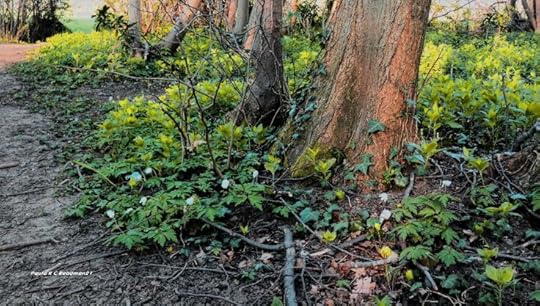



Have a lovely day, Everyone. Chat with you again soon.
April 11, 2021
A quick post
 Photo by Torsten Dettlaff on Pexels.com
Photo by Torsten Dettlaff on Pexels.comI was just sorting through my emails trying to delete the ones I really don’t need to keep. It’s like a journey back in time. I guess in the past we would have kept our correspondence in a desk, sorted into bills, letters from loved ones and general information. As I paged down the list, I’m travelling back to 2009, names of friends and moments in history jumped out at me.
From enquires into family history, photos taken at Whitby Goth Festivals to submissions and rejections of novels now published.
Why is it so hard to let go of things that no longer matter?
These emails are dead. The time has past and they mean nothing to others. Oh, I have printed copies of the most important ones.
Searching through the sent ones, I saw replies to my dear friends’ emails who are no longer with us. I wanted so much to delete them, but my finger just hovered over them. To delete would be like wiping them away forever. Such a tiny link to them. It’s as though I could write to them, send a last email to them. A message that would fly through time and space to reach them on other side. To let them know I hadn’t forgotten them.
I couldn’t do it. The non-important emails remain for another day.
Now I’m off for a walk. Have a great day all.
April 10, 2021
Hello From Granny Wenlock.
 The Witch
The Witch This morning I woke with Granny Wenlock speaking to me which was a nice surprise. Not that she has been quiet up until now. It’s just that she’s stopped nagging me, and now is telling me things I need to know to move the plot forward. I’ve been a bit concerned about a sticking point that’s slowly been growing on the horizon.
The problem is how to work out a way of bringing the past and present together without being too cliché. That’s the difficulty with writing time-slip novels. There’s only so many ways of doing it while keeping it natural to the reader.
Using Granny as Dave’s conscience in The Funeral Birds worked well, but to carry it through the length of a novel or even a series of books, I feel the reader needs to know more about Granny and who she was/is as a person. I know what I want for Granny, and she’s made it very clear to me that she doesn’t want to be a time-traveller. She’s happy enough to help Dave, with future cases as long as it’s from her own place and time.
This will make it all the more interesting for me to write, and to solve the problem of how to fill the reader in on who Granny Wenlock is and why she wants to help her descendant, Dave. As Granny says, it doesn’t matter what era we live in, or where in the world we live, human nature is all the same. Our lives are controlled by the same emotions, which can be used for either good or evil. Men are men, just as women are women, we all have the same basic wants and needs, so nothing has really changed.
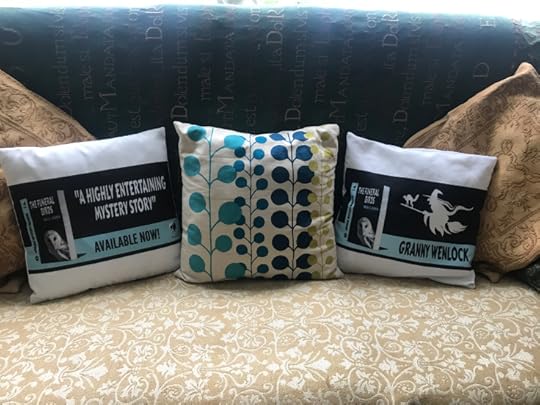
I’m off to chat with Granny now. I’m just as interested in finding out what her makes her tick as you are .
.
Bye for now.
April 9, 2021
A Walk In The Wood
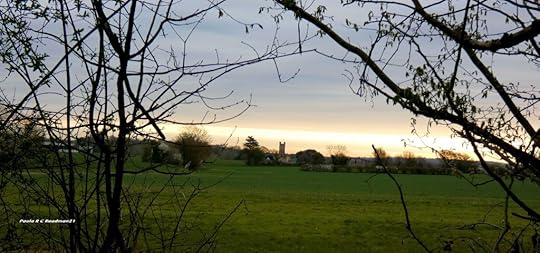 View towards Rivenhall Church from Tarecroft Wood
View towards Rivenhall Church from Tarecroft WoodYesterday our walk took us along part of the footpath known as John Ray Walk. John Ray was born in the Essex village of Black Notley in 1627 and died in 1705. He became known as the father of British Natural History and spent a lifetime describing and classifying plants in Britain, Europe and beyond. The development of the John Ray Walk was a partnership between the John Ray Trust, Essex County Council, and Braintree District Council.
John’s father, Roger was a blacksmith and his mother, Elizabeth was a herbalist. He gained his love of nature from her as they went gathering plants from the countryside around their home. When reflecting on his childhood he wrote as a young boy he saw how frequently the flowers of the buttercup were in the gardens near his home. The route is marked out with a buttercup flower.

Though John Ray Walk covers over 9 miles and links the towns of Braintree and Witham together, we followed a short part of it. The route took us past Whiteheads farm.
Ist Slide: a rough guide of our route: 2nd Slide: John Ray Walk: 3rd Slide: Path: 4th Slide: View towards Cressing Temple: 5th Slide: 13th Century Knights Templar Barns: 6th Slide: Whiteheads Farm: 7th Slide: track to the Woods

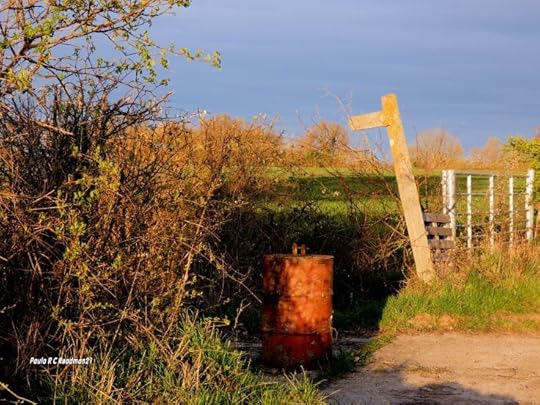



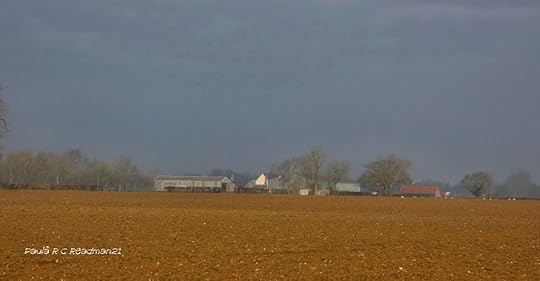
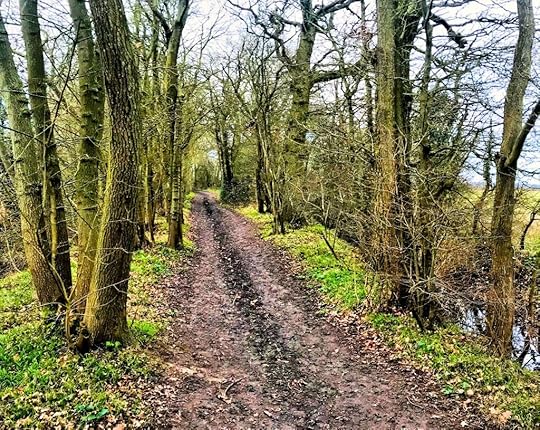
The first wood we entered is know as Tarecroft Wood. Both Rivenhall Thicks and Tarecroft were part of an ancient woodland that was part of the Knight Templar estate. At one time within Rivenhall Thicks a small farm was carved out as depicted on a 1716 map. The mass woodland that stretched across the area from Cressing Temple barns to Rivenhall Church was probably the secondary colonization following the Black Death, but the research I found online suggests that Tarecroft Wood is a relict of the former wild wood, or derived directly from it.
Ancient woods are irreplaceable. One way of dating a wood near you is by the different plants and trees found growing there. The biodiversity of a wood has accumulated over hundreds of years. Bluebell, wood anemone, primrose, wild garlic, barnacle lichen, Lungwort lichen, Guelder Rose, Small-leaved Lime, Wild Service tree, spindle are a good sign of how long the wood has been there, as well as early flowering purple orchids too. Not forgetting the more common bigger trees such as oak, beech and elm too.
 Bluebells, surrounded by Dog’s mercury and cuckoo-pint (the broad green leaves)
Bluebells, surrounded by Dog’s mercury and cuckoo-pint (the broad green leaves)Arum maculatum also known as Cuckoo pint named in Nicholas Culpepers’ famous 17th-century herbal. The word Pint is a shortened pintle meaning penis derived from the shape of the spadix within flower. Another name for the plant in 1601 was Wake Robin, meaning, erect penis.
Dog’s Mercury is another good indicator that the woods are ancient. All parts of plant are poisonous and can induce jaundice, diarrhoea, vomiting and even death, but it is great for wild life such as some species of ground-nesting birds like woodcock who are drawn to areas colonised with dog’s mercury. Speckled bush cricket nymphs feed on the leaves, along with other species including beetles, weevils, springtails and molluscs.
English Bluebells bulbs were once used for making glue and starch for stiffen the elaborate ruffs worn by the Eliazbethans but nowadays digging up the bulbs for any purpose is illegal. Trampling-down leaves are as threatening to the survival of the English bluebells. The plant can survive without its flowers, but if the leaves are crushed it will die from lack of light that feeds it.
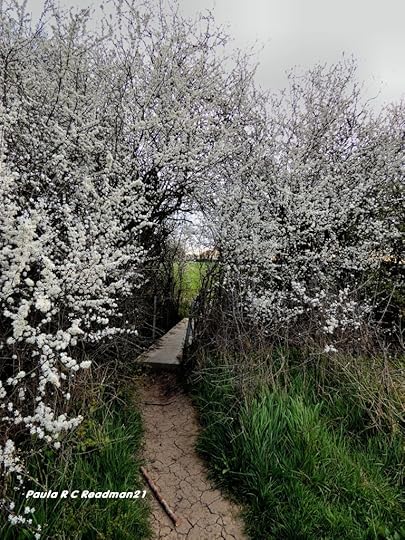 After leaving Tarecroft wood we entered Rivenhall Thicks by this bridge over a ditch.
After leaving Tarecroft wood we entered Rivenhall Thicks by this bridge over a ditch.In the Rivenhall Thicks we met the owner of the woods who was busy working. On a ten year cycle he cuts back different areas of the underwood to sell it for making and laying hedges and fences. Most common underwood in Rivenhall Thicks is hazel, though the owner told us he had lost much of his ash trees due to Ash-dieback which has devastated our countryside.
1st Slide: Spurge laurel, Ivy and Primrose: 2nd Slide: red dead nettle: 3rd Slide: Cowslip or Paigle: 4th Slide: summer snowflake: 5th Slide: Woodpecker old nest 6th Slide: Swan on its nest by the Lake 7th Slide Wych Elm seeds. The word Wych is a Anglo-Saxon word meaning pliable. The tree has a greater resistance to dutch elm disease. 8th Slide: Coppicing in the woods.
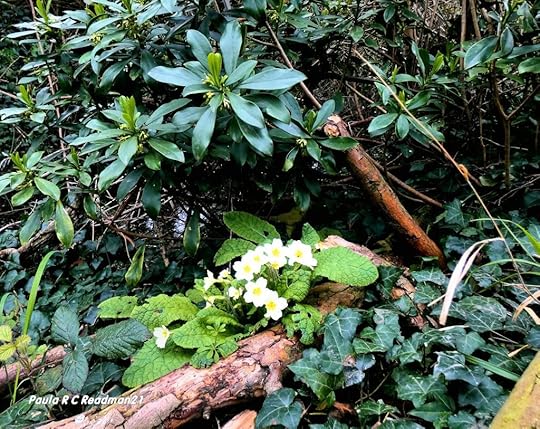





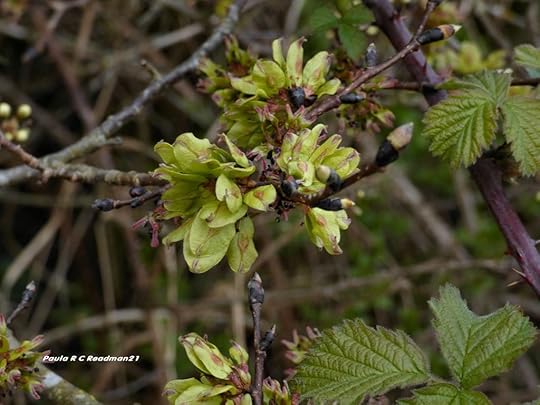

I hope you enjoyed my walk through the history of the area where I live. Have a wonderful weekend, and I’ll be back for another chat with you soon.
April 7, 2021
What does a Botanical Magazine and Fallen Women Have in Common?
Yesterday, while out walking we took a new route. Parts of it we’ve walked before, but it was a simply case of turning left onto a footpath that took us on a circular route around a wooded area.
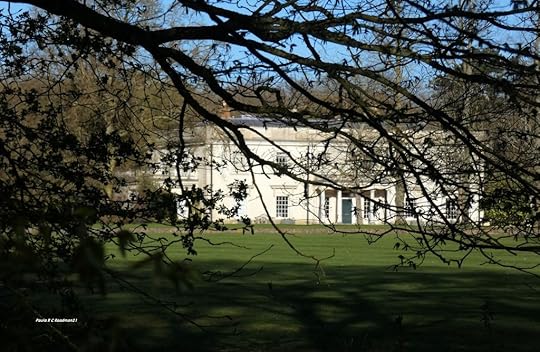 Glazenwood House
Glazenwood House
We headed out of Silver End on the Sheep Cote Lane and followed the footpath towards Perry Green, a small hamlet. Here a collection of three delightful houses stand, one being the farm house and another was once a row of farm labourer’s cottages.
The first slide: The Perry Green Farm house. Second slide: this house stands opposite the farm house. Third Slide: Farm labourer’s cottages: Fourth slide: Crossroads signpost: Fifth Slide: One of the gate lodges to Glazenwood House.


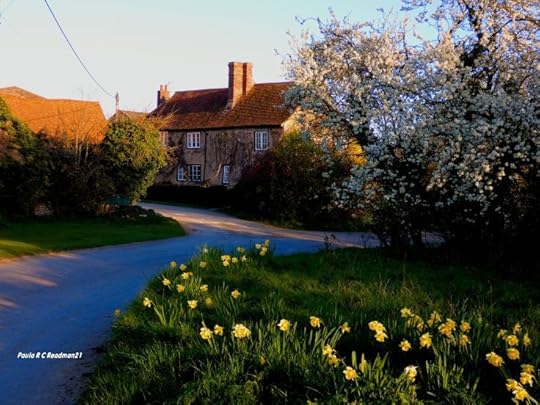
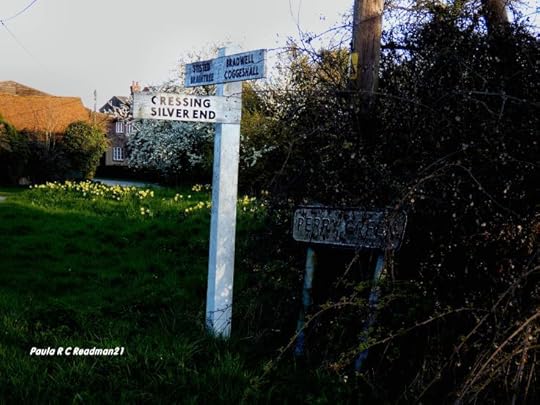

I wanted to find out more about the estate known as Glazenwood and found online an interesting site called Essex Gardens Trust There I discovered an interesting and wonderful article about the house I had only glimpsed through the trees as we walked along the farm track.
Glazenwood takes its name from the wood which surrounds the house and was first mentioned in 1291 on maps and in documents. The property was first acquired by a Coggeshall Quaker, Joseph Greenwood in 1802. He built a small red-brick house. From April 1806 to April 1820 Greenwood rented the property to Samuel Curtis.
Samuel Curtis, was born into a large Quaker family at Walworth, Surrey, England on 22 August 1779. He was nurseryman, publisher and editor, particularly in London, England in the 19th century. From 1816 to 1821, he worked at Clumber Park in Northumberland, England as a land agent to Henry Pelham-Clinton, 4th Duke of Newcastle under Lyne, and lived at Gamston Hall in Nottinghamshire, England. In 1821 he moved to Glazenwood, near Coggeshall in Essex, England where he established another, larger nursery specializing in fruit trees and a wide mixture of plants. In 1822, he published the third edition of the Florist’s Directory.
 The Clockhouse is house once owned by Samuel Curtis. The black line is a rough guide to the route we took.
The Clockhouse is house once owned by Samuel Curtis. The black line is a rough guide to the route we took.
Samuel was a son-in-law and cousin to William Curtis, the founder of the Botanical Magazine in 1787. Samuel married William’s only child, Sarah and became the proprietor of the famous magazine. His many daughters hand-coloured the plates for the Botanical magazine, which were published at Glazenwood from 1827 with the start of a new series. Samuel sold his rights in the magazine in 1846, six years after he retired to Jersey, leaving his son James to carry on his business at Glazenwood.
 Footpath around the woods.
Footpath around the woods.
Award Winning Samuel during his time at Glazenwood enlarged the house and planted the pleasure grounds and orchard along with a large number of ornamental trees and shrubs. He also held an annual floral fete in the grounds. The grounds at Glazenwood were divided into different areas.i.e. American plants were concentrated in the American gardens while Australian plants in the Australian gardens.
In its life time the house has been owned by Revd. Sir John Page Wood Clergyman; son of Matthew Wood (q.v.) and Maria Page (q.v.); in 1820 m. Emma Caroline (1802-1879); father of General Sir Evelyn Wood. Chaplain and private secretary of Queen Caroline (q.v.) in 1820. Ordered Deacon in 1821. Chaplain to the duke of Sussex (1821-43). Appointed rector of St Peter’s, Cornhill, in 1824; vicar of Cressing in Essex.
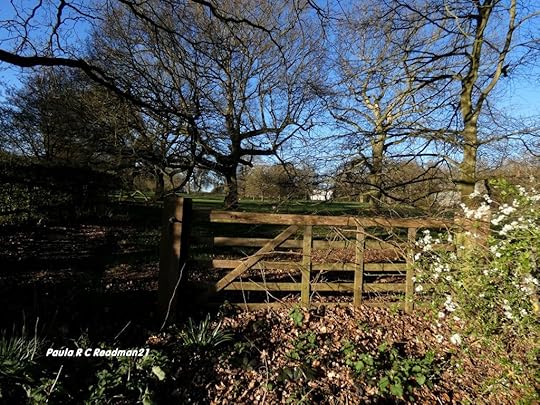 The gateway from the road looking towards the Glazenwood House.
The gateway from the road looking towards the Glazenwood House.
In the 1868 the house was sold to Sisters of the Good Shepherd, a home for fallen women. A Roman Catholic Order of Nuns came to England from France in 1840 and set up a series of homes across Britain and in Ireland to save fallen women and girls from prostitution and from the streets of the towns and cities. The women and girls were used as cheap labour in the laundry and needlework businesses set up by the nuns. Glazenwood Sisters of the Good Shepherd closed in 1872 as it failed to generate enough money for the nuns because of its rural location. During WW2 the house was used to house children evacuated from London. For awhile the house fell into a neglected state until it was bought in 1962.
 Farm Track
Farm Track
I hope you enjoy reading the research I found online about this amazing house. Have a great day. I’m off to do some writing now.
April 6, 2021
Understand Stone Angels & You’ll understand the Street Artist Banksy.
My first novel Stone Angels now has 57 reviews UK ( 51 reviews, USA) on Amazon, but what I find fascinating is how all the reviewers have a different view of the plot.
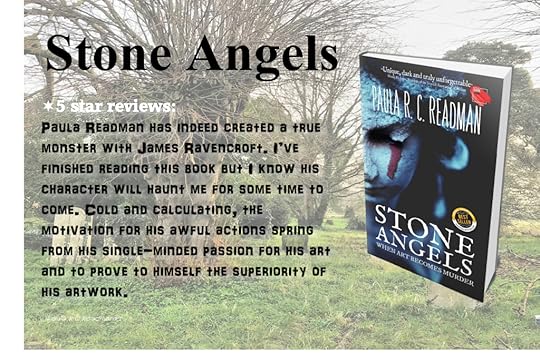
Yes, they all have found it to be a dark and disturbing novel. Artist, James Ravencroft is a driven man who sees the world through a series of lines on canvas. When I wrote the novel, I wasn’t sure whether I could put into words James’ descent into madness while keeping the reader wanting to know more, or whether I had the ability to write his drive to paint that the reader would understand him enough to keep turning the page.
I knew what I didn’t want to write. James isn’t a rapist, nor in his eyes is he a murderer. He doesn’t see his treatment of his angels in an earthly sense of cruelty after all his paintings put the models at the centre of his universe. To him they are a thing of purity and beauty and the world will want to possess them, to pay a fortune to own an angel paintings, and he was right.
We learn at the end of the book as James sits waiting in the police station ( no spoilers here) his paintings are changing hands on the black market for large sums of money. James realises his mother’s obsession with owing her own work was that she understood that its real value wasn’t in her skills as an artist, but how much an unique piece of art is worth to others.
As the Street artist Banksy shows us in real life the true value in art isn’t in its creation, but the uniqueness of the piece of work. To own something no one else has. Even though Banksy paints works of art for all of us to enjoy on sides of buildings the paintings are stolen from us and sold to the highest bidder. In Stone Angels no one really care that the models suffered for James’ art they were only interested in what the paintings were worth.
 Here is the latest review on Stone Angels.
Here is the latest review on Stone Angels. My other news is The Last Thread, my latest short story in the Women of Horror anthology vol 3 The One That Got Away is going to be used in an university in America in a English course. How wonderful is that for all us writers in the book.

Chat again soon. I’m off for a walk now.

